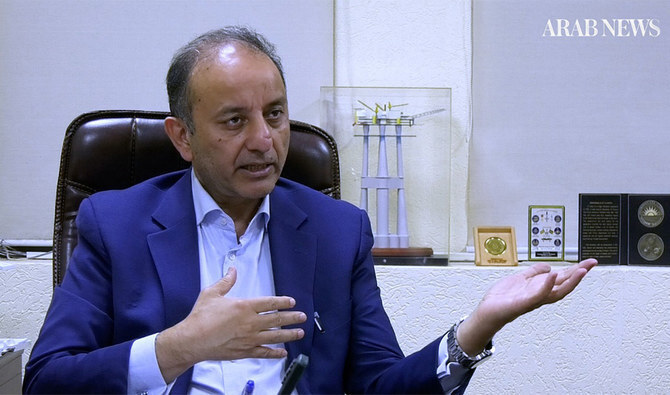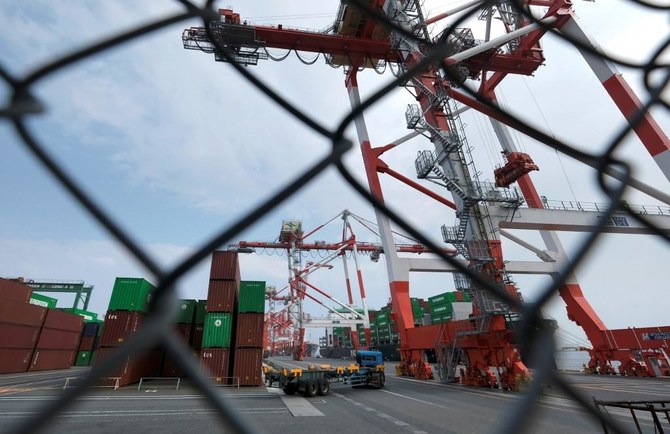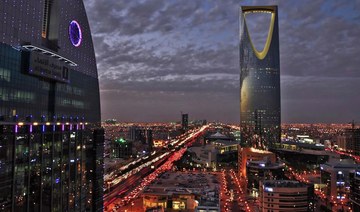TOKYO: Officials in Japan appeared wary over the prospects for a trade deal with the US after President Donald Trump said he was prepared to sign a pact soon.
Japan’s chief government spokesman, Yoshihide Suga, said Tuesday that the two sides are still finalizing details after reaching a basic agreement in late August on trade in farm products, digital trade and other industries.
Suga said Trump and Prime Minister Shinzo Abe are considering signing a deal in late September when they attend the UN General Assembly in New York.
“We are accelerating the work that still remains,” he said. “But I decline to comment further because we have not reached a formal agreement.”
Trump’s notice to Congress, released by the White House on Monday, did not mention tariffs on autos and parts, long a sticking point between the two countries.
It said his administration was looking forward to collaborating with lawmakers on a deal that would result in “more fair and reciprocal trade” between the two countries.
Toshimitsu Motegi, who became foreign minister last week after negotiating the deal as economy minister, said Japan must watch carefully to prevent Washington from forcing any last-minute changes, Kyodo News agency reported.
The agricultural minister, Taku Eto, cautioned against letting down Tokyo’s guard until the final agreement is reached, it said.
A long-sought trade agreement with Japan was scrapped when Trump withdrew the US from a pan-Pacific trade agreement shortly after taking office in 2017.
Japan and the other 10 remaining members of the trade pact, the Trans-Pacific Partnership, then renegotiated their own deal without the US
Trump said he preferred that Washington and Tokyo strike a bilateral deal.
That resurrected the longtime issue of tariffs on Japanese car and auto parts exports to the US and of stiffer duties on US exports of farm and other products to Japan.
Japanese officials cautious on prospects for US trade deal
Japanese officials cautious on prospects for US trade deal

- A long-sought trade pact with Japan was scrapped when Donald Trump withdrew the US from a pan-Pacific trade agreement shortly after taking office in 2017
- Trump said he preferred that Washington and Tokyo strike a bilateral deal
Saudi Arabia, Djibouti ink deal to protect mutual investments

RIYADH: Investments between Saudi Arabia and Djibouti will see new protection measures thanks to an agreement between the two countries.
The deal, which was inked on the sidelines of the second day of the 28th World Investment Conference taking place in Riyadh from Nov. 25 — 27, aims to provide many advantages to investors.
These include investment protection, national treatment, and fair and equitable treatment, as well as transparency, and the right to resolve disputes through national courts or international arbitration, according to the Saudi Press Agency.
The agreement aims to provide a safe business environment that increases the volume of mutual investments in all sectors. It also seeks to further encourage bilateral relations and economic partnerships between the two sides.
This falls in line with the significant progress in bilateral trade, which reached approximately SR7 billion ($1.86 billion) in 2023, marking an important step toward sustainable growth and stronger economic ties between the Kingdom and Djibouti.
The deal was signed by the Kingdom’s Minister of Investment, Khalid Al-Falih, and by the Minister of State for Investments and Private Sector Development in Djibouti, Safia Ali Jadila.
The two sides stressed the importance of the deal’s role in supporting and motivating both countries’ private and government sectors to invest and achieve the ambitious investment programs witnessed by the two nations.
Saudi Arabia and Tajikistan ink deal to boost non-oil trade

RIYADH: Saudi Arabia and Tajikistan have signed a memorandum of understanding to accelerate non-oil exports and knowledge sharing.
According to the Kingdom’s press agency, the MoU was signed by the Saudi Export Development Authority and the Export Agency of Tajikistan on the sidelines of an event which agreed to establish a bilateral business council between the countries.
That agreement was reached by the Federation of Saudi Chambers and the Chamber of Commerce and Industry in Tajikistan, and will see the promotion of trade and investment relations.
Bolstering non-oil exports and promoting trade between nations is a crucial goal outlined in Saudi Arabia’s Vision 2030 agenda, as the Kingdom is on an economic diversification journey by reducing its dependence on crude revenues.
The Saudi-Tajik Business Council is expected to serve as a platform for private sector communities in the Kingdom and Tajikistan to network, showcase their activities, and foster commercial partnerships.
The council will also work to open new areas for economic collaboration, facilitate continuous interaction between the private sectors of both countries, and exchange information on market opportunities.
During the ongoing 28th edition of the World Investment Conference in Riyadh, Bandar Alkhorayef, Saudi Arabia’s minister of industry and mineral resources, held a bilateral meeting with the First Deputy Prime Minister of Tajikistan, Hakim Khalikzoda, and discussed ways to enhance cooperation in the mining and industrial sectors.
Alkhorayef also met with the Tunisian Minister of Economy and Planning, Samir Abdel Hafeez, and discussed ways to develop bilateral relations in the industrial sector between both nations.
Earlier this month, the Kingdom and Tunisia signed an MoU to strengthen bilateral cooperation and promote direct investments between the two nations.
The deal, which was inked by Saudi Arabia’s Minister of Investment Khalid Al-Falih and Tunisia’s Minister of Economy and Planning, focuses on sharing regulations and laws to enhance the investment environment in both countries.
The agreement between Tunisia and Saudi Arabia is seen as a crucial step in deepening the economic and industrial ties between both nations as they seek to diversify their economies and create new growth opportunities through strategic partnerships.
A report released by Saudi Arabia’s General Authority for Statistics in November revealed that the country’s non-oil exports reached SR79.48 billion ($21.16 billion) in the third quarter of this year, representing a rise of 16.76 percent compared to the same period in 2023.
Saudi education POS defies trend, surges 178%: SAMA data

RIYADH: Education spending in Saudi Arabia soared 178.6 percent to SR249.5 million ($66.4 million) during the week of Nov. 17–23, bucking the broader decline across other sectors.
According to the Saudi Central Bank’s weekly point-of-sale transactions bulletin, education was the sole sector to record growth. Transactions in the category climbed 62.3 percent to 164,000.
By contrast, other consumer spending categories experienced sharp declines. Clothing and footwear posted the steepest drop, falling 25.1 percent to SR694 million. Hotel expenditures followed, dipping 23.5 percent to SR305.6 million.
Spending in restaurants and cafes, which accounted for the second-largest share of total POS value, decreased 19.6 percent to SR1.66 billion.
Overall, Saudi Arabia’s POS transactions shrank 13.1 percent week on week, with total expenditures declining to SR11.5 billion from SR13.2 billion in the prior week.
The central bank’s figures showed that the electronics sector saw a 9.3 percent slide to SR179.6 million, while telecommunications expenditures dropped 11.2 percent to SR104 million.
The food and beverages category — the largest contributor to POS transactions — saw a 9.8 percent dip to SR1.7 billion. Miscellaneous goods and services, which ranked third, fell 10.6 percent to SR1.3 billion. Together, the top three categories accounted for 41.3 percent, or SR4.7 billion, of the week’s total transaction value.
At 3 percent, the smallest decrease occurred in spending on construction and building materials, leading total payments to SR340.5 million. Expenditures in the health sector dipped by 7.3 percent to SR710 million.
Regional insights
Geographically, Riyadh dominated POS transactions, representing 35.9 percent of the total, with expenses in the capital reaching SR4.1 billion — an 8.2 percent decrease from the previous week.
Jeddah followed with a 14.2 percent dip to SR1.5 billion, and Dammam came in third at SR590.5 million, down 7.9 percent.
Hail experienced the most significant dip in spending, decreasing 20 percent to SR177.4 million. Tabouk and Abha recorded declines by 11.4 percent and 9.8 percent reaching SR209 million and SR134.9 million, respectively.
Makkah and Madinah saw the largest transaction decreases, falling 15.2 percent and 14.9 percent, respectively, to 7.6 million and 7.8 million transactions.
Oil Updates – prices steady with focus on Israel-Hezbollah ceasefire, OPEC+ policy

TOKYO: Oil prices steadied on Wednesday, with markets assessing the potential impact of a ceasefire deal between Israel and Hezbollah, and ahead of Sunday’s OPEC+ meeting of producers.
Brent crude futures rose 5 cents to $72.86 a barrel by 7:15 a.m. Saudi time, while US West Texas Intermediate crude futures were up 3 cents at $68.80 a barrel.
Both benchmarks settled lower on Tuesday after Israel agreed to a ceasefire deal with Lebanon’s Hezbollah.
A ceasefire between Israel and Hezbollah will take effect on Wednesday after both sides accepted an agreement brokered by the US and France, US President Joe Biden said on Tuesday.
The accord cleared the way for an end to a conflict across the Israeli-Lebanese border that has killed thousands of people since it was ignited by the Gaza war last year.
Israeli Prime Minister Benjamin Netanyahu said he was ready to implement the deal with Lebanon and would “respond forcefully to any violation” by Hezbollah.
“Market participants are assessing whether the ceasefire will be observed,” said Hiroyuki Kikukawa, president of NS Trading, a unit of Nissan Securities.
“We expect WTI to trade within the range of $65-$70 a barrel, factoring in weather conditions during the Northern Hemisphere’s winter, a potential increase in shale oil and gas production under the incoming Donald Trump administration in the US, and demand trends in China,” he said.
On the Organization of the Petroleum Exporting Countries and allies led by Russia, or OPEC+, sources said the group is discussing a further delay to a planned oil output hike that was due to start in January, ahead of a Dec. 1 meeting to decide policy for early 2025.
The group pumps about half the world’s oil and had planned to gradually roll back oil-production cuts with small increases over many months in 2024 and 2025. But a slowdown in Chinese and global demand, and rising output outside the group, have put a dampener on that plan.
“Our longstanding base case has been that OPEC+ defers the tapering of output cuts all the way through 2025,” Citi Research analysts said in a note, adding that the tapering could start in April instead of January.
“From the producer group’s point of view, holding off the unwind could allow the market the chance to be more balanced, via supply disruptions or more resilient demand, while bringing barrels back makes lower prices a foregone conclusion.”
In the US, President-elect Donald Trump said he would impose a 25 percent tariff on all products coming into the US from Mexico and Canada. Crude oil would not be exempt from the trade penalties, sources told Reuters on Tuesday.
Meanwhile, US crude oil stocks fell while fuel inventories rose last week, market sources said, citing API figures on Tuesday.
Crude stocks fell by 5.94 million barrels in the week ended Nov. 22, exceeding analysts’ forecast of a drop of about 600,000 barrels.
Saudi Arabia, Pakistan in talks on refinery upgrades, greenfield project: official says

RIYADH: Saudi Arabia is set to deepen its strategic partnership with Pakistan through talks on refinery upgrades and a greenfield project for petroleum products, according to an official.
Speaking to Arab News on the sidelines of the World Investment Conference held in Riyadh, Musadik Malik, senator and minister of state for petroleum of Pakistan, noted that the collaboration extends beyond energy projects and includes an agreement to connect power grids between the two nations.
“We are working very closely with the Kingdom to figure out how, what are the future energy needs, particularly in the area of renewables, and jointly, we’re going to identify and scope the opportunity, and jointly we’re going to build a program to fulfill those needs,” Malik said.
He continued: “We have two different projects which are right now under, to say, research.
One is the upgradation of quantifier refineries, and the other is a large greenfield refinery which would not only produce petroleum products but also hydrocarbons. These are under research and negotiation, so these are not finalized.”
Malik highlighted that the partnership goes beyond just securing investments or transferring advanced technology. Instead, it involves a joint effort to carefully analyze Pakistan’s future energy needs and map out potential scenarios for how these demands might evolve over time.
This forward-looking approach ensures that both nations are not just reacting to immediate energy challenges but are proactively planning for the long term.
By working together to address these evolving requirements, Saudi Arabia and Pakistan aim to guarantee Pakistan’s energy security, creating a sustainable and reliable framework that supports the country’s growth and development.
Saudi Arabia and Pakistan are making significant strides in strengthening private-sector collaborations, with multiple agreements already yielding tangible results.
Malik highlighted the proactive approach both nations are taking to foster business-to-business partnerships.
“Our prime minister believes that the government should not be in the business of doing business but should facilitate it,” he said, emphasizing the central theme of the collaboration.
“A very large part of the concept we are jointly building on is the private sector of the Kingdom working with the private sector of Pakistan.”
The minister added that around $2.8 billion worth of memorandums of understanding have been signed between the two countries in October.
“Out of these 28 to 30 MOUs, seven or eight have already been converted into contracts and executed within just three to four months,” Malik said.
He continued, explaining the momentum of the partnership: “We have transacted significant deals, and contracts are in motion. Yesterday (Nov. 25), during a roadshow with the Kingdom’s private sector, we secured a non-disclosure agreement that could pave the way for a $1.8 billion investment.”
Malik emphasized the multifaceted nature of Saudi Arabia’s involvement in Pakistan, describing it as a “360-degree view” encompassing both public and private sectors.
“We are not only receiving investments and technology but also collaborating on long-term strategies to meet Pakistan’s growing energy demands,” he said. “The Kingdom’s Public Investment Fund and subsidiaries are actively identifying opportunities for mutual growth.”
Pakistan is tackling the challenge of energy demand fluctuations, a longstanding issue where consumption peaks in summer and drops to a third during winter.
This cyclicality forces the country to make capacity payments to investors, covering equity returns and debt servicing even when energy is underutilized, Malik explained.
To address this inefficiency, Pakistan signed an MoU with Saudi Arabia to connect their power grids.
“This grid connection will allow energy produced in the Kingdom and Pakistan to be transacted seamlessly,” Malik said. “When we connect with Saudi Arabia, it effectively means connecting with the GCC as well.”
The initiative also aligns with regional energy strategies, as Pakistan seeks similar arrangements with Central Asian states.
“In Central Asia, energy demand is high in winter and negligible in summer. With this connectivity, deficits will no longer remain deficits, and surpluses will clear in real-time,” he added, highlighting plans for a unified energy market facilitated by a shared grid.
Malik concluded the interview by praising Saudi Arabia’s unwavering support for Pakistan, describing the Kingdom as a true and steadfast ally.
“In good times and bad, we have always found the Kingdom by our side. This is the hallmark of true friendship,” he said.





















